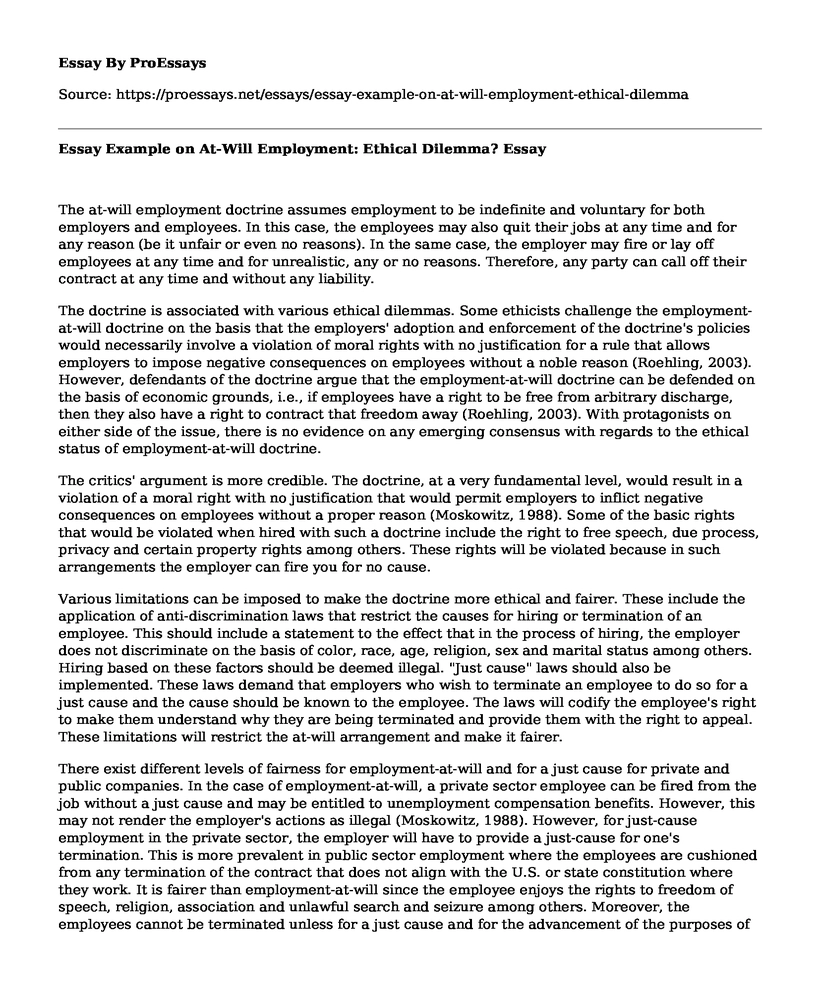The at-will employment doctrine assumes employment to be indefinite and voluntary for both employers and employees. In this case, the employees may also quit their jobs at any time and for any reason (be it unfair or even no reasons). In the same case, the employer may fire or lay off employees at any time and for unrealistic, any or no reasons. Therefore, any party can call off their contract at any time and without any liability.
The doctrine is associated with various ethical dilemmas. Some ethicists challenge the employment-at-will doctrine on the basis that the employers' adoption and enforcement of the doctrine's policies would necessarily involve a violation of moral rights with no justification for a rule that allows employers to impose negative consequences on employees without a noble reason (Roehling, 2003). However, defendants of the doctrine argue that the employment-at-will doctrine can be defended on the basis of economic grounds, i.e., if employees have a right to be free from arbitrary discharge, then they also have a right to contract that freedom away (Roehling, 2003). With protagonists on either side of the issue, there is no evidence on any emerging consensus with regards to the ethical status of employment-at-will doctrine.
The critics' argument is more credible. The doctrine, at a very fundamental level, would result in a violation of a moral right with no justification that would permit employers to inflict negative consequences on employees without a proper reason (Moskowitz, 1988). Some of the basic rights that would be violated when hired with such a doctrine include the right to free speech, due process, privacy and certain property rights among others. These rights will be violated because in such arrangements the employer can fire you for no cause.
Various limitations can be imposed to make the doctrine more ethical and fairer. These include the application of anti-discrimination laws that restrict the causes for hiring or termination of an employee. This should include a statement to the effect that in the process of hiring, the employer does not discriminate on the basis of color, race, age, religion, sex and marital status among others. Hiring based on these factors should be deemed illegal. "Just cause" laws should also be implemented. These laws demand that employers who wish to terminate an employee to do so for a just cause and the cause should be known to the employee. The laws will codify the employee's right to make them understand why they are being terminated and provide them with the right to appeal. These limitations will restrict the at-will arrangement and make it fairer.
There exist different levels of fairness for employment-at-will and for a just cause for private and public companies. In the case of employment-at-will, a private sector employee can be fired from the job without a just cause and may be entitled to unemployment compensation benefits. However, this may not render the employer's actions as illegal (Moskowitz, 1988). However, for just-cause employment in the private sector, the employer will have to provide a just-cause for one's termination. This is more prevalent in public sector employment where the employees are cushioned from any termination of the contract that does not align with the U.S. or state constitution where they work. It is fairer than employment-at-will since the employee enjoys the rights to freedom of speech, religion, association and unlawful search and seizure among others. Moreover, the employees cannot be terminated unless for a just cause and for the advancement of the purposes of the agency.
Conclusion
To conclude, while employment-at-will may provide equal rights to both employer and employee in terms of termination of a contract, it has various shortcomings that should be addressed to ensure fairness while addressing the existing ethical dilemmas.
References
Moskowitz, S. (1988). Employment-at-Will & Codes of Ethics: The Professional's dilemma. C Scholar.valpo.edu. Retrieved from https://scholar.valpo.edu/cgi/viewcontent.cgi?article=2043&context=vulr
Roehling, M. (2003). The Employment At-Will Doctrine: Second Level Ethical Issues and Analysis. Jstor.org. Retrieved from https://www.jstor.org/stable/pdf/25075131.pdf?refreqid=excelsior%3A8096648cb4237ae74d068256c7ef016e
Cite this page
Essay Example on At-Will Employment: Ethical Dilemma?. (2022, Dec 29). Retrieved from https://proessays.net/essays/essay-example-on-at-will-employment-ethical-dilemma
If you are the original author of this essay and no longer wish to have it published on the ProEssays website, please click below to request its removal:
- Influence of Computers
- Psychology Paper Sample: How Parental Verbal Abuse Affects Child Personality and Social Behavior
- Understanding of Children Regarding Gender-related Responsibilities of Parents
- The Patriarchal Tradition: Late Marriage in the 1500s-1800s - Essay Sample
- Race, Delinquency & Neighbourhoods - Essay Sample
- Paper Example on Leadership & Interprofessional Collaboration in Health & Social Care
- Paper Example on Celebrating Diversity: Our Organization's Diversity Day







